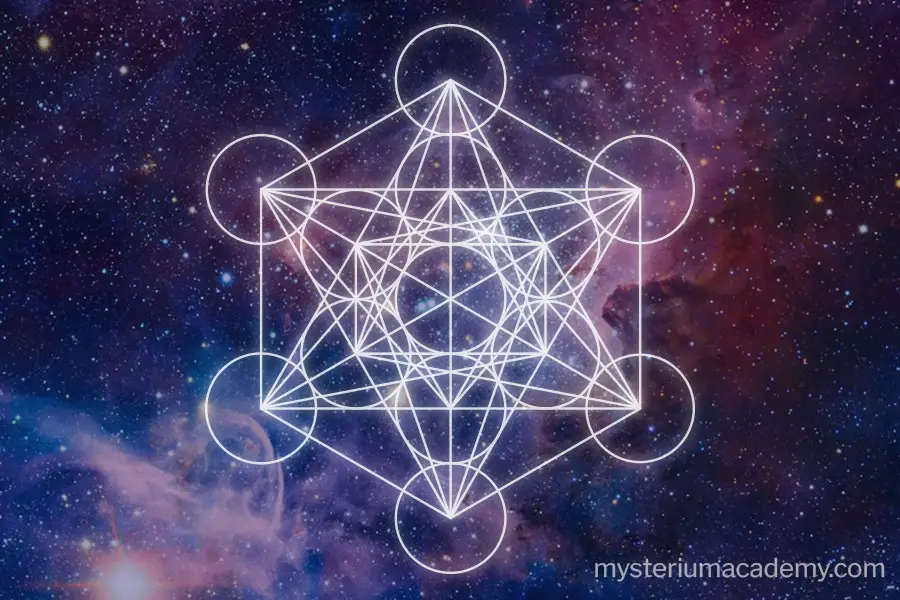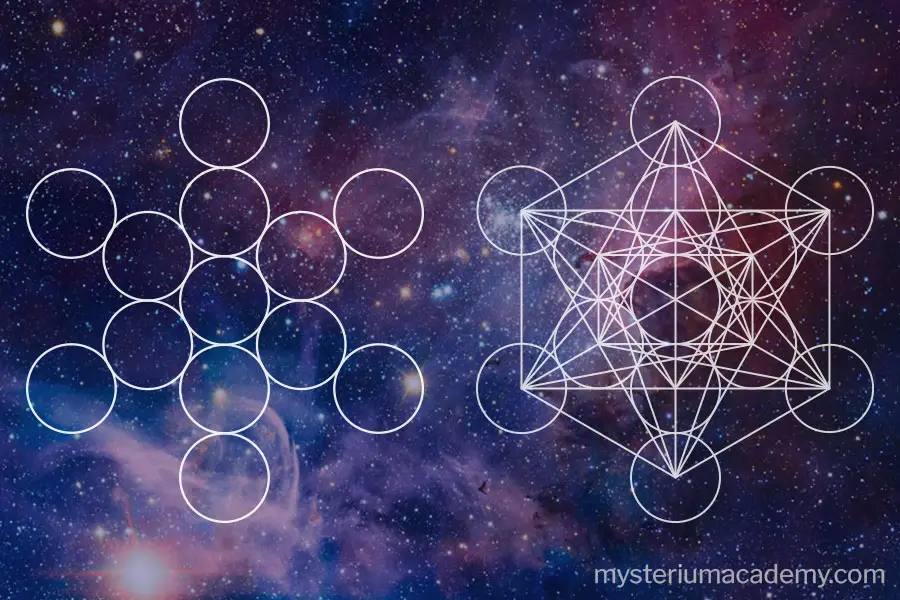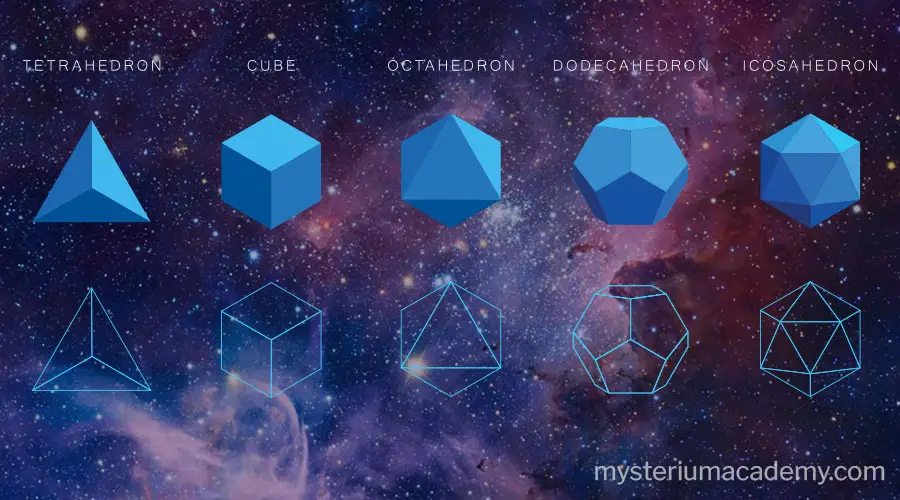Metatron’s Cube is one of the most beautiful shapes in sacred geometry, and contains incredible amounts of information about the universe.
Metatron’s Cube introduces the masculine into the creation process of sacred geometry, and is formed by adding straight lines between the circles of the Fruit of Life shape in Sacred Geometry. Metatron’s Cube contains the Platonic solids, the building blocks of the universe.
It is one of the most important information systems in the universe, and is named after the Archangel Metatron.

Metatron’s Cube in the Flower of Life
In order to understand Metatron’s Cube, it is important to realize that is an aspect of another shape in sacred geometry, called the Flower of Life. The Flower of Life contains literally everything in existence within its shape, and starts with the Torus shape. The torus rotates either inward or outward, and as it rotates, it forms the different stages of creation in the flower of life pattern. Through this process we get Metatron’s Cube.
The first rotation of the torus forms a shape called the Egg of Life, which is a little cluster of spheres. The egg of life is the morphogenetic (meaning the biological process that causes cells to develop) structure that creates our bodies.
When creation rotates through the torus pattern another time, it forms another shape called the Fruit of Life, which is thirteen circles. It is considered an extremely sacred symbol, and is called the fruit of life because it is so important to the structure of our reality, forming the fabric, or the fruit, of our reality. It is also the shape that occurs just prior to Metatron’s Cube in the creation process.

Metatron’s Cube is formed by talking the Fruit of Life and combining male and female. The circles of the Fruit of Life are female, and the masculine energy is superimposed by adding straight lines. When you draw straight lines between the centers of every circle, you get Metatron’s Cube. Within these lines you get the Platonic solids, which are the building blocks of the universe.
The Five Platonic Solids Come from Metatron’s Cube
In geometry, there are five basic shapes, which are called the Platonic solids. One of the most important characteristics of the platonic solids is that their faces are all the same size. For example, the cube has six square faces, each of which are exactly the same size. Also, the edges of the platonic solids are all the same size. The third characteristic is that the angles between the edges are all the same. The fourth characteristic is if you place these shapes inside of a sphere, all of the points will be touching the sphere.
There are only five shapes in existence that meet this criteria. The five platonic shapes are:

Cube
The most well-known of the Platonic solids, it has six faces, all of which are squares.
Tetrahedron
Tetra means four, and it is shape that has four faces, all of which are equilateral triangles.
Octahedron
Octa means eight, and it is shape that has eight faces, all of which are equilateral triangles.
Icosdhedron
This shape has twenty faces, all of which are equilateral triangles.
Pentagonal Dodecahedron
This shape is a different than the others because its faces have five sides rather than triangles. It has twelve faces (dodeca means 12)
When you look at Metatron’s Cube, you are seeing all of the Platonic solids at the same time. In order to see them more clearly, you can erase some of the lines. Here are the five Platonic Solids, as they are found within Metatron’s Cube:
Each Platonic Solid is an Element
According to the ancient Greeks, each of the five Platonic solids is also an element, and are the building blocks of the universe.
cube = earth
tetrahedron = fire
octahedron = air
Icosdhedron = water
Dodecahedron = ether
The elemental aspect of the solids is an important concept in alchemy. The ether element in particular was considered so important that it was only discussed in secret. In Pythagoras’s school, if anyone even mentioned the Dodecahedron in public, they would be killed.
The outer most edge of our personal energy fields is a sphere, but just inside of that is a 55 foot wide dodecahedron. Also, the universe is a big dodecahedron, and our individual energy fields are holographic reflections of it.
The Platonic Solids and DNA
According to alchemical thinking, the Platonic solids are the building blocks of our reality. This can be seen in our DNA which is a combination of dodecahedrons and icosahedrons. The DNA molecule is a rotating cube, and as it rotates it first forms an icosahedron, then a dodecahedron again, and repeats again and again, going back and forth between the two shapes.
Metatron’s Cube is named after the Archangel Metatron
Metatron is one of only two angles to have ascended into angelic form from a human incarnation. He represents empowerment, as he demonstrates that we are all capable of our own ascensions.
Considered one of the greatest angels in Judaism, he is portrayed as the Prince of Presence. After his journey to heaven he became known as Enoch. His role is to record the sins of humans, which he records in the Akashic records. He also acts as a mediator between God and men. Metatron is not mentioned in the Hebrew Bible, and only appears briefly in the Talmud. He is mostly described in Kabbalistic writings.
Metatron is also considered the archetype of man, or the perfection of what humanity is to become. He is 55 feet tall with blue skin. According the New Age beliefs, humanity is on a journey in which we will incarnate into other dimensions of the universe, eventually taking on this form, being 55 feet tall and having blue skin.
Known for his intensely high vibrational frequency, Metatron is often called upon for healing and cleansing, or assisting in our own ascension process.
Recommended Reading
If you want to continue exploring this subject more deeply, you can see which books I recommend by clicking here.

